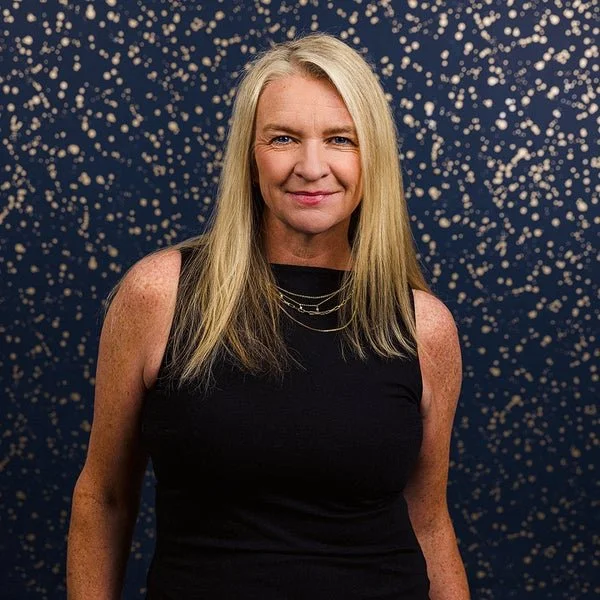Building the Business You Don't Want to Sell: Wisdom from Stacie Staub
When we brought entrepreneur Stacie Staub to speak with students in our Entrepreneurship, Innovation, and Social Impact class at Meredith College, I knew they were in for something special. What I didn't anticipate was how her raw honesty about the messy, beautiful journey of building West + Main Homes would illuminate truths that every entrepreneur, at any stage, needs to hear.
"No one's going to work as hard as you do. No one's going to care as much about the business. The only person I trust to partner with now is Madie."
-Stacie Staub, West + Main Homes
Stacie co-founded West + Main Homes in 2017 with her business partner Madie, starting with $10,000 each and a refusal to follow the traditional playbook. Today, they run a hugely successful brokerage with nearly $1 billion in real estate sales, a mortgage business, a coffee shop (expanding to a restaurant), two Pilates studios, and a creative agency. All are independently owned, never diluted by outside investors, and built on principles that most business schools would tell you are impossible.
Here's what makes their story worth your attention.
When "No" Becomes Your North Star
Early in the conversation, Stacie shared: "I just never wanted a board of old white guys sitting in New York telling me what to do and how to run my business."
It wasn't bravado. It was clarity.
She and Madie watched their previous company get acquired and recognized they were part of the "value" being sold, human beings reduced to line items in an acquisition deal. So they walked away and started their own company, determined to control their destiny even if it meant doing everything themselves.
The lesson: Sometimes knowing what you won't tolerate is more powerful than knowing what you want. Your boundaries become your blueprint.
The Queen Bee Philosophy: Building an Ecosystem
Stacie introduced us to their "queen bee" framework. West + Main Homes is the queen, and every other business exists to protect and support it. The coffee shop brings foot traffic past the real estate office. The Pilates studio creates community connections. The mortgage company serves its clients' needs without handing them over to strangers.
When a storefront opened next to their main office, instead of worrying about competition or distraction, they asked: "What does our neighborhood need?" The answer was good coffee and a place to gather. So they built it.
The lesson: Opportunity recognition isn't always about the next big idea. Sometimes it's about being present enough to see what's missing right in front of you and having the courage to fill that gap.
The 50-50 Partnership Everyone Said Would Fail
Business advisors told them not to do it. Equal partnerships "never work." Someone always needs to have final say.
Stacie and Madie ignored them.
They started 80-20 (Stacie had more experience), but by year two, Stacie equalized it. "I trust you," she told Madie. "We're here for each other. This partnership is strong."
Their secret? They treat their partnership like a marriage. They go to counseling and coaching. They stay out of each other's lanes. They prioritize the relationship alongside the revenue.
"I don't think guys can do that as easily," Stacie said plainly. "They don't know how to treat a marriage, and they certainly don't know how to treat an equal partner with the respect and integrity this requires."
They're writing a book about it now because it's that rare in business. (We can’t wait until this comes out!)
The lesson: The supposedly "impossible" 50-50 partnership works when both people value the relationship as much as the results. Emotional intelligence isn't just a soft skill. It's strategic infrastructure.
The $200K Lesson in Trust
Not every expansion went smoothly. When they partnered with a mortgage company in Las Vegas, it felt like the smart move. They had experienced partners, established systems, and one of them was even British and charming (her words, not mine).
Two years later, they discovered the partner's accountant had been collecting payroll taxes but never paying them. They were $200,000 in debt.
Stacie's takeaway wasn't to never partner again. It was simpler and harder: "No one's going to work as hard as you do. No one's going to care as much about the business. The only person I trust to partner with now is Madie."
The lesson: Expensive mistakes teach you where your trust belongs. Sometimes the lesson costs six figures. Pay attention and don't repeat it.
Sales Is Service (Niceness is Non-Negotiable)
When students asked about essential business skills, Stacie didn't talk about financial modeling or market analysis. She talked about being nice. About taking care of people. About working in a restaurant, you learn time management and customer service.
"I can teach anyone to sell property," she said. "I can't teach you how to be nice."
Then she shared something that made the whole room lean in: Ten years ago, she took a personality assessment that labeled her a "technician,” someone good at executing other people's ideas, not leading. Last week, she took the same test. The result? "Dynamo,” a natural leader.
"I decided I didn't want to be a technician," she explained. "I forced that change in myself. I crawled my way out of that personality because I wanted to lead a big company and be successful."
The lesson: Where you start is not where you finish. You can choose to become who you need to be. Growth can be about rewiring your identity.
Done Is Better Than Perfect (Forget the Printer)
One of my favorite moments was when Stacie described people who want to start businesses but get stuck on logistics: "But what about a printer?"
She laughed. "Don't overthink the little stuff. Think about the big picture and then manage the details as you go."
Stacie and Madie painted their first office themselves because they couldn't afford furniture. They designed a logo that still holds up today. Two weeks after signing their lease, they had yard signs up, and agents were calling.
The lesson: Perfection is procrastination in disguise. Start messy. Improve as you go. Action creates clarity that planning never will.
If It's Not a Hell Yes, It's a No
Near the end of our session, a student asked how Stacie decides what opportunities to pursue when you're juggling multiple businesses.
"If it's not a hell yes, it's a no," she answered without hesitation.
She explained that she spent years saying yes to every committee, every board position, every opportunity out of obligation or fear of missing out. It cost her time, energy, and money she'll never get back.
Now she listens to her gut. If there's even a moment of doubt, she passes. And if it's meant to be, it comes back around when the timing is right.
As she put it, quoting Taylor Swift: "Your time and energy is a luxury item. Treat it as such. Not everyone can afford it."
The lesson: Cultivating intuition is a competitive advantage. Your gut feeling is data. Trust it.
The Work No One Tells You About
Stacie didn't sugarcoat anything. She talked about the rollercoaster moments that made them question whether they should have sold cupcakes instead of houses. The failed Oregon expansion taught her that she can't hand over control. The mortgage disaster cost them $200K. The realization that she'd never had a female mentor and had a breakdown about it.
But she also radiated something unmistakable: Joy. Pride. Purpose.
At 51, she's teaching Pilates because it challenges her nervous system. Madie is taking art classes. They're funding their curiosity and growth from the real estate company they built on their own terms, with their own money, for their own reasons.
"I can't imagine a time of not continuing to do this," she said. "What's better than being able to employ people and give them an awesome place to work doing what they love?"
For the Entrepreneurs Reading This
Whether you're sitting on the floor of an empty storefront like Stacie and Madie were in 2017, or you're years into building something you're not sure will work, here's what I want you to take from this:
You don't need permission. You need action.
Your boundaries are as important as your vision.
Intuition sharpens with practice (and failure).
The right partnership can change everything. Choose carefully.
Investors aren't always the answer. Sovereignty matters.
Be nice. Seriously. It's non-negotiable.
Done beats perfect every single time.
If it's not a hell yes, it's a no.
And maybe most importantly: You can build a business you don't want to sell. You can create something that funds your life, serves your community, and lets you stay exactly who you are, or become who you want to be.
Stacie proved it's possible. Now go prove it for yourself.
Want to connect with Stacie? She meant it when she said to DM her on Instagram (@staciestaub). She'll respond. And if you're looking for more conversations like this, where we celebrate women doing impossible things on their own terms, you're in exactly the right place.
— Molly McKinley, Founder of Redtail Creative & Professor of Entrepreneurship at Meredith College



